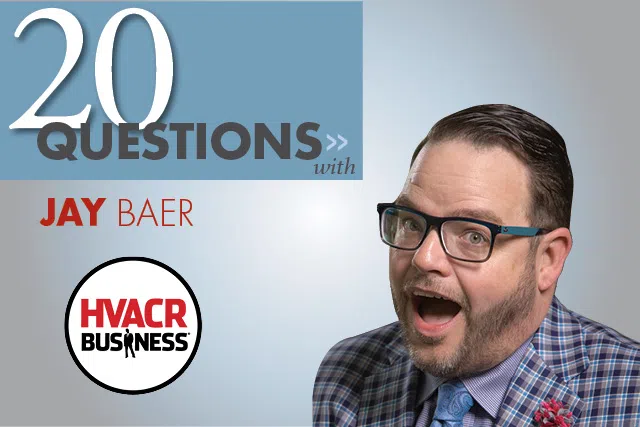We sat down with Jay Baer, digital marketing guru, keynote speaker and best-selling author. Baer, whose newest book Talk Triggers is available now, discussed digital marketing for contractors, online reviews and what makes for great customer service.
1. Can you tell us a little about your background?
I grew up in a small town in Arizona. Went to school at University of Arizona for journalism, but fell in love with politics. I was a politics pro for a bit and moved into marketing, then digital. I’m a seventh generation entrepreneur and have stared five, multi-million dollar companies.
2. How did you get into digital marketing?
I started in politics, running political campaigns and spent some time working for Senator John McCain, among others. I worked for the government, as a spokesman, for a very short time before getting into traditional marketing, and then digital way back in 1993. I’ve only done two smart things, ever: convinced my wife to marry me; and got involved in digital way early, and had the good sense to stay in it.
3. What is digital marketing?
That’s tougher to describe than ever. I guess I’d say “any attempt to drive purchase that is executed in a two-dimensional environment.”
4. Is there still a place for good old-fashioned print marketing?
Absolutely — and perhaps more than ever. It’s a zig vs. zag principle. So few organizations do good print now that when you actually execute it well, it really works. Case in point, LinkedIn Marketing Solutions is now publishing a fantastic, quarterly print magazine.
5. Your new book is called ‘Talk Triggers’ — what is a talk trigger?
A Talk Trigger is a strategic, operational differentiator that compels word of mouth. It’s that special thing you do that your customers simply must tell someone else about. Any company can do it, and every company should. After all, the best way to grow any business is for your customer to do it for you — that’s what word of mouth can do.
6. Are there different kinds of talk triggers?
There are five types: Talkable Generosity, Empathy, Responsiveness, Usefulness and Attitude. None are better than the others. Some fit the cultural DNA of specific companies better. For example, Talkable Attitude isn’t for all organizations. You talk trigger has to fit your overall brand.
7. How can contractors use talk triggers?
What’s amazing is that word of mouth impacts 50 to 91 percent of all purchases. Contractors can absolutely create a talk trigger that their customers will pass along via word of mouth. We use a great example in the book about a locksmith that does a security audit for free after re-keying a home. Another story in the book about WindsorOne, which gives free T-shirts to master carpenters.
8. So, how do you implement a talk trigger?
The first step is to map out when and how the contractor interacts with customers. Second, is to understand what customers expect at each step (because once you know what they expect, you know what they wouldn’t expect — that’s where you talk trigger lives). Finally, you need to invent a few talkable differentiators and test them to see which of them customers notice and discuss.
9. Do contractors need to hire a specialist to handle digital marketing?
It depends on how much time and effort they want to expend, how they acquire customers today and what else they could spend that money on. Digital isn’t hard, but it’s complicated. And it’s getting more complicated by the month. It’s more about time than expertise. I’ll also say this: if you don’t love digital, you’ll suck at digital. You have to WANT to spend the time to learn and get better — or you won’t. It’s easy to be decent at digital, part-time. It’s impossible to be great at digital, part-time.
10. What advice do you have for a contractor who is getting bad online reviews?
Step one is to answer every review with grace, humility and speed. Remember, customer service is a spectator sport. Then, analyze the reviews and look for commonality. What are the trends? Step three is to have a very HONEST conversation with yourself about truth (and consequences). Most of the time, a pattern of negative reviews is at least partially true. Fix what’s broken, best you can. Finally, determine if customer dissatisfaction is driven by miscommunication. If so, you need to inform customers better.
11. You’ve said bad review are good for business, could you explain?
Customers tend to distrust when 100 percent of the reviews are positive. They think the whole thing is bogus. You want a little bad in there — especially if you respond nicely — to show that the reviews are legitimate.
12. What should contractors do to increase their good online reviews?
The obvious answer is to do better work. But, as I say in ‘Talk Triggers,’ competency doesn’t always create conversations. The best way to get more, positive reviews is to do something DIFFERENT that customers notice. Also, it’s a good idea to gently remind customers that you appreciate and pay attention to reviews. If you don’t emphasize it, they won’t either, in most cases.
13. What shouldn’t you do to get good reviews?
Do not compensate customers for reviews. It’s not only unethical; it also doesn’t work, according to a new study.
14. What can a contractor do to increase its digital marketing?
Just show people what you do. Think like a documentary filmmaker. You know all the stuff you think is routine and boring? Customers think it’s FASCINATING! Show them what you do, and what you know, especially with video.
15. What’s the biggest mistake you see businesses make with online reviews?
Ignoring them.
16. How has social media changed the game for customer service?
It’s a spectator sport now. The economic consequences of the people looking at social media are way higher than the consequences of the one customer who was happy/unhappy.
17. What makes for great customer service today?
It’s a moving target, for sure. In general: fast, information-rich, platform agnostic and empathetic is the way to go.
18. How do you market your great customer service?
Usually, you don’t need to do so. If it’s truly great, your customers will take care of marketing it for you.
19. How will marketing change in the future?
More video. More messaging (less email). More reliance on real people and word of mouth to drive commerce.
20. What’s the best advice you ever received?
Remember: Some days you’re the pigeon, and some days you’re the statue.






